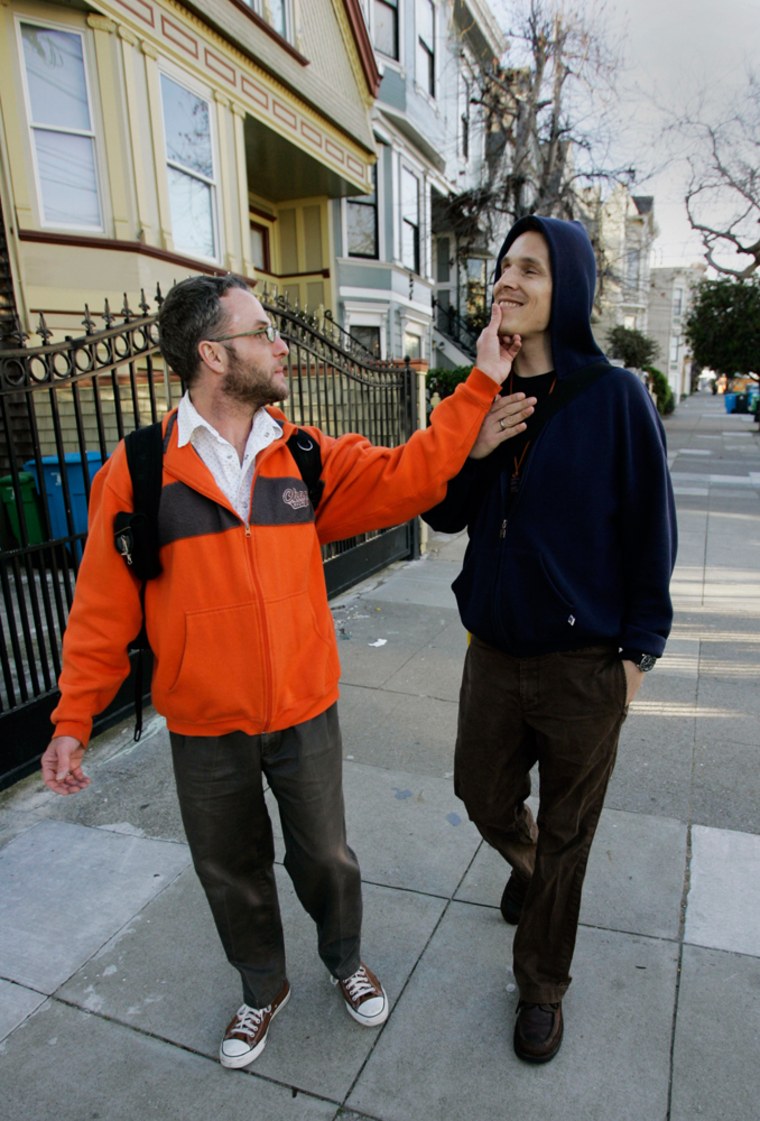In just about any other place, the sight of a man and woman pushing a stroller would be welcomed as a sign of stability and safety. In San Francisco's heavily gay Castro District, some people can't help but think: There goes the neighborhood.
Gay leaders in the Castro and other gay neighborhoods around the country fear their enclaves are losing their distinct identities.
These areas are slowly being altered by an influx of heterosexual couples, the forces of gentrification, and growing confidence among gays that they can live pretty much wherever they want nowadays and do not need the security of being in a "gay ghetto."
"What I've heard from some people is, 'We don't need the Castro anymore because essentially San Francisco is our Castro,'" said Don Romesburg, co-chairman of the GLBT Historical Society, a group that represents gays, lesbians, bisexuals and transsexuals.
For decades, most big cities have had a district that was understood to be the place to go if you were gay — the West Village and Chelsea in New York City, Dupont Circle in Washington, the South End in Boston. Men and women who had kept their sexual orientations hidden reveled in the freedom to live openly as gay.
AIDS no longer a stigma
Don Reuter, a New York writer researching a book on the rise and fall of gay neighborhoods in the U.S., said he has observed a trend in cities as far-flung as New Orleans, Philadelphia and Seattle: Gay neighborhoods are becoming "Disneyfied" places, with chain stores and other businesses with little or no overt appeal to gays.
"What makes these neighborhoods gay? Not much," he concluded.
As the fear of AIDS has eased, gay neighborhoods have become attractive to developers and investors trying to encourage families and empty-nesters to return to city centers, Reuter said.
Besides the brigades of baby strollers in the Castro, ominous signs include the security gates installed last year by a hotel to discourage "cruising," and the recent closing of a store that sold erotic leather gear. National chains like Pottery Barn and Diesel now occupy prominent Castro locations.
In addition, a sex toys shop that had posters from gay porn movies in the window and an antiques store that had a naked male statue were asked last year to tone down their displays. They grudgingly obliged.
Rising rents force some out
Several nonprofit agencies serving the gay community in the Castro have also moved out because of rising rents. Meanwhile, 500 new apartments and condominiums are planned for the area, and half of them have been designated "family housing."
"When I see a stroller now, I see it as someone who evicted a person with AIDS, right or wrong," said longtime community leader Brian Basinger, president of the Harvey Milk Lesbian Gay Bisexual and Transsexual Democratic Club.
No one is suggesting that the Castro has been overrun by heterosexuals just yet.
The neighborhood has the nation's second-highest concentration of same-sex couples, behind the Cape Cod resort of Provincetown, Mass., according to analysis of 2000 census figures. And San Francisco as a whole is still America's unofficial gay capital, with gays making up 15 percent of the population.
Compliment or curse?
"I think people are looking for something to worry about," said Betty Sullivan, a writer and event producer who lives in the Castro. "I take the fact that some straight people want to live here as a compliment."
But some activists point to cities with less-established gay districts as a sign of what could happen. Honolulu's Kuhio district stands vacant after its gay bars were dispersed during an economic revitalization project in the late 1980s. In Atlanta's Midtown, gay nightclubs recently have given way to condominiums, diminishing the neighborhood's allure as a gay nightspot.
Community activists worry that "gayborhoods" are losing their relevance as gays win legal rights and greater social acceptance.
"Thirty years ago, if I lived in the Midwest and I was gay, my thought was I would go to San Francisco or New York," says Gary Gates, a demographer for the Williams Institute, a think tank at UCLA that specializes in sexual orientation and the law. "Now, a person can go to Kansas City and find a fairly active and open gay community."
In fact, from 2000 to 2005, the 10 states with the biggest increases in the percentage of gay couples were all in the Midwest, Gates said.
Sandy Sachs, a nightclub owner in gay-friendly West Hollywood, has started promoting special dance nights for straight Iranians, Israelis and Russians because her gay clientele has fallen off. Sachs said that many gay men and lesbians now prefer to meet potential partners on the Internet.
Another factor contributing to the decline of gay neighborhoods: Many young gays feel comfortable mixing with people of different genders and sexual orientations.
"We don't want to ostracize ourselves," said Matty Lamos, 20, who moved to San Francisco's diverse Mission District from nearby Petaluma three years ago.
Activists agree it is a good thing that gay people no longer feel confined to the Castro, but some fear younger generations will overlook their history.
"We have Chinatown and Japantown and so forth, and that's important for minority communities in this country, to have a place where they can get a sense of being the majority," said Joe Curtin, an architect who serves as president of Castro Area Planning Action. "But if you took those away, you would still have China and Japan. If the Castro goes away as a gay neighborhood, there is nowhere else."
